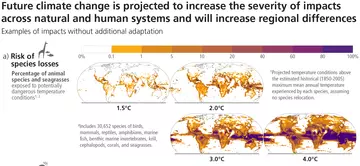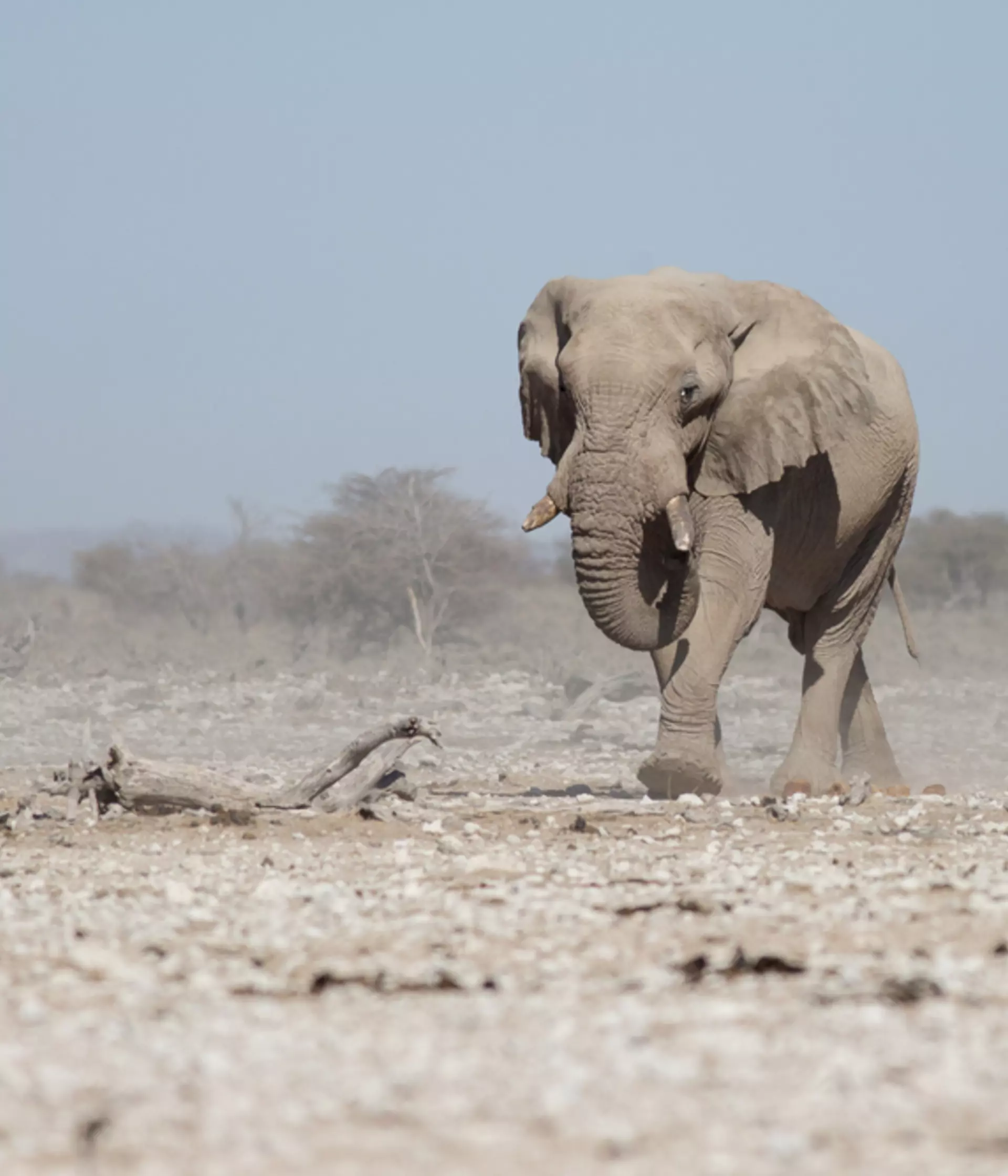
Bethan Laughlin
Senior Policy Specialist
Climate change and wildlife
What is the IPCC Synthesis report?
Global surface temperatures have increased faster since 1970 than in any other 50-year period over at least the last 2000 years, while atmospheric CO2 levels are higher than at any time in the last 2 million years.
So states the latest UN report from the world’s leading climate scientists – the Intergovernmental Panel on Climate Change (IPCC). Published Monday 20 March, this major new report, designed as a summary for policy makers, has been touted as a “survival guide for humanity”, outlining where the world currently is with the fight against climate change, and what action is needed to avoid climate disaster. The report is an amalgamation of thousands of climate and biodiversity science findings from 2018 to 2022 which make clear the devastating impact climate change will have unless transformational change is taken by political leaders worldwide.
Parts of it are a bleak read – many ecosystems have already experienced irreversible change. Rising temperatures have driven the loss of hundreds of species and each point of a degree of warming brings with it more threats. Vitally, the report makes clear that within the next decade it is very likely global warming will exceed the 1.5°C threshold that, if crossed, risks more extreme climate change impacts and further irrevocable damage to critical ecosystems.
However, the report also makes clear that it is never too late to take action. While the looming future of global warming rising above the 1.5°C threshold is a troubling one, the experts also outline that by acting now, we can stop global temperatures rising above that threshold and start to cool the planet again.
Every increment of global warming will intensify multiple hazards for people and biodiversity – but that makes it all the more important that we do all we can to limit every degree of warming and work to bring temperatures back down.
Protecting and restoring nature is a part of that action. The science is clear - nature is not only impacted by climate change, but also a part of the answer to tackling it.
How would overshooting 1.5°C impact biodiversity?
The findings of this report strongly align with what ZSL research has consistently shown, wildlife across the globe is already being negatively impacted by warming temperatures – extreme heat, flood and coral bleaching are already pushing species to the edge of extinction and ecosystems to the brink of collapse.
For example, our work shows that higher temperatures increase the risk of African wild dogs catching diseases or dying as result of human activity, while changing climatic conditions make it harder for seabirds to feed their chicks. As the planet becomes hotter, these negative impacts can only be expected to become amplified, as with each additional increment of global warming the consequences will become larger.

The IPCC report makes clear that habitats such as forests, coral reefs and Arctic regions risk experiencing increasing levels of species extinction, leading to irreversible loss of biodiversity ecosystems across the globe - taking with them the valuable services that they offer such as providing food, storing carbon, and controlling disease. If temperatures continue to rise above the 1.5°C threshold and creep towards 4.0°C of warming, there are multiple regions across land and sea that risk becoming inhospitable to up to 100% of the species living there.
How does protecting biodiversity help address climate change?
The good news is that alongside reducing fossil fuel use, protecting biodiversity – through conservation efforts and the restoration of ecosystems – plays a crucial role in addressing climate change, mitigating its impacts, and taking control of this crisis. The IPCC report found that the restoration of ecosystems alone will have the largest impact on offsetting the economic impacts of climate change – such as costs associated with harm to human health, crop failure and damages to housing.
The report also highlights the need for a transformational approach to how cities and urban landscapes are designed to adapt to climate impacts and mitigate against them. Rewilding urban spaces will both help capture carbon to prevent further warming and future proof these spaces against the impacts of heatwaves, storms and heavy rains.
ZSL research has highlighted how greening roofs and walls will help to keep cities cool during periods of extreme heat, while recovering coastal habitats near cities will help protect against floods- and identifying key plants and animals living in cities and supporting them are key to maintaining these new habitats.
Ecosystems are complex, interconnected webs of species, and losing pieces of this network can lead to the whole structure starting to collapse - protecting each part of is vital for maintaining healthy, functioning ecosystems.
The report makes clear that working to protect and restore peatlands, mangroves and forests is vital, as this will result in both immediate benefits (such as flooding prevention through soaking up heavy rainfall) and long-term benefits as the trees absorb and lock up atmospheric carbon. Reducing the deforestation of tropical forests alone will have the greatest mitigation impact.
In our oceans, focused conservation work to restore overexploited fish populations will counteract climate change’s impact on marine life and associated concerns over food security.
All these efforts cannot happen in isolation. Nature-based solutions and ecosystem-based adaptation measures become less effective the warmer the planet gets, so it’s essential that conservation efforts to restore nature and combat climate change happen alongside global decarbonisation to reduce greenhouse gas emissions. For too long, investment in nature and the task of decarbonisation have been tackled independently – but science makes clear that these interconnected crisis requires interconnected solutions.
Positive actions towards decarbonisation and investment in nature are already taking place, but the pace is too slow.
What climate action do we need from world leaders?
The IPCC report gives an alarming glimpse into a future world where immediate action to combat climate change isn’t taken – but it also gives a message of hope. We are not living in that future yet, and we still have a chance to change it – however this needs immediate action as the window of opportunity to secure a sustainable future is rapidly closing. As the report makes clear: “The choices and actions implemented in this decade will have impacts now and for thousands of years.”
Without a major strengthening of policies to cut global emissions, global temperatures are predicted to rise by approximately 3.2°C by the end of the century. Many leaders across the world have already signalled their intention to reach net-zero greenhouse gas or CO2 emissions by 2050, but there are limited policies in place to actually deliver on these intensions. At present, even if all current national commitments are met (with no increase in ambition) we are still on track for a global warming of 2.8°C by 2100, clearly showing that current levels of ambition are not sufficient. World leaders need to commit to taking meaningful action to cut fossil fuel usage in favour of green energy alternatives and drastically reduce emissions.
Some future changes are already unavoidable, but by rapidly working towards decarbonization and nature goals, their impacts can be limited.
World leaders must focus on parallel efforts of rapid decarbonisation alongside protecting biodiversity and restoring ecosystems across the planet.
Maintaining nature’s resilience to climate change relies on protecting 30-50% of land, freshwater and ocean areas for nature. This will require countries to commit to implementing the goals and targets of 2022’s Global Biodiversity Framework, which includes the commitment to protect 30% of Earth’s land, ocean and freshwater by 2030. Incentivising shifts towards sustainable agricultural and land management practices in order to free up land for reforestation and restoring ecosystems will also be vital.
The goals that must be urgently met to address climate change are ambitious, and cooperation will be key to reaching them – both on an international level to ensure that adequate resources are available to tackle climate change and its impacts, and through inclusive decision-making that works with and incorporates the experience of the Indigenous People’s and Local Communities (IPLC) that live alongside these ecosystems.
We believe nature can recover, and work across the globe to help secure a sustainable future for life across our planet. Tackling climate change needs all of our support - we need world leaders to take meaningful action today to cut emissions and restore the natural world, and we need people worldwide to hold them to account and help protect nature.
